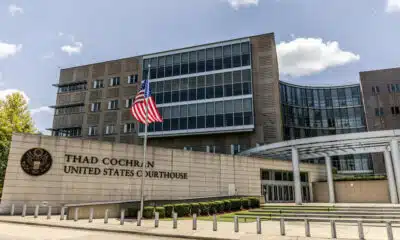Mississippi Today
Greenwood Leflore Hospital goes up for lease, again

Last summer, Greenwood Leflore Hospital was on the brink of closure and up for lease.
Now, despite applying for grants from the Legislature, closing several service lines and requesting a more lucrative hospital designation, the hospital is back to square one: it’s going up for lease again.
Greenwood’s hospital is co-owned by the city and county and has long been plagued with financial struggles, like many of Mississippi’s rural hospitals. During the pandemic, the hospital’s finances went from bad to worse, as costs went up and payments did not.
In an effort to stay open, Greenwood Leflore has closed several departments and services, including neurosurgery, urology and inpatient dialysis. Most recently, it shuttered its labor and delivery department and intensive care unit.
Interim CEO Gary Marchand told Mississippi Today in February that the hospital was running out of money and months away from closure.
However, thanks to a credit line increase from its owners and the passage of a statewide hospital grant program, Marchand said in April that the hospital would stay open until at least 2024.
In the meantime, in order to make the hospital more financially viable, leaders applied for Greenwood Leflore Hospital, which is currently classified as an acute care facility, to be converted to a critical access hospital. Critical access hospitals are reimbursed by Medicare at a higher rate.
But the hospital’s application has not yet been approved, and approval isn’t guaranteed — critical access hospitals must be located 35 miles from the nearest hospital, and South Sunflower County Hospital in Indianola is 28 miles away.
Marchand is hoping for a waiver because of transportation challenges in the Delta, but it could be months before he gets an answer from the federal government.

Until final approval, Marchand said the hospital needs a “plan B” to stay open.
“From Greenwood Hospital’s perspective, plan A is to get critical access hospital status and obtain long-term viability,” he said. “I think the owners … just wanted a backup plan.”
Hospital leaders are publishing an RFP, or request for proposal, on Aug. 29 in the local paper, the Greenwood Commonwealth, to solicit bidders to take over the hospital. This time around, the RFP includes an option to buy the hospital outright, not just lease it.
Greenwood Mayor Carolyn McAdams said she’s already heard from several “entities as far as California” about their interest in the hospital.
The space went up for lease last year, and the hospital was in discussions with the University of Mississippi Medical Center to lease the facility. But mere days before the deal was expected to be finalized, UMMC pulled out. A UMMC leader only cited “health care economics” as a reason.
At the time, Greenwood Leflore Hospital reportedly owed Medicaid millions in advance payments it got when the pandemic began, and UMMC did not want to take on those debts.
According to Marchand, an RFP for a lease with an option to purchase has a relatively short time frame for completion, which is why leaders went with that option last year — the hospital’s situation was dire.
Now, Greenwood Leflore Hospital can afford a little more time — though not much more. Marchand declined to get into specifics about the hospital’s finances.
“The hospital is still struggling,” McAdams said. “The city and county had to go in and do the $10 million line of credit so we could get through this process of applying for critical access without them having to worry every month if they were going to be able to meet payroll or not.”
According to a Greenwood Commonwealth article from Aug. 16, a consultant hired to advise community leaders about the hospital suggested that Greenwood Leflore Hospital cut administrative pay and base its physician pay on productivity.
Marchand said he was not considering making those changes.
Greenwood hasn’t gotten the money it was promised from the Legislature yet — because the grant money is coming from pandemic relief funds and not the state general fund, many hospitals have reported difficulties getting their hands on their allotted money and will only be able to claim part of it.
Greenwood was granted a little under a million. As of this week, they’ve received $0, according to Marchand.
“To my knowledge, they haven’t paid a single hospital,” he said.
No hospital has gotten that money yet, confirmed Kris Adcock, senior deputy at the Mississippi State Health Department. It’s not clear when it’ll be disbursed.
McAdams said hospital leaders are pursuing both an RFP and critical access designation, not one over the other, exhausting all options to ensure the facility’s survival.
“Every community needs a hospital,” she said. “We serve not only Greenwood but all the communities around us … There are a lot of people here who can’t go to Jackson. They can’t even get to Grenada. They need access to this hospital.
“Truly, it’s terrible, but we are not the only hospital struggling here. All of our community hospitals, especially in the Delta, are struggling with the same problem.”
One report puts nearly half of the state’s rural hospitals at risk of closure. In rural Mississippi, these closures could be especially devastating, both for these communities’ economic livelihood and Mississippians’ wellbeing.
McAdams said that without Medicaid expansion, the situation is only getting worse. Republican state leaders have steadfastly opposed expanding Medicaid to the working poor, despite support from the majority of Mississippians.
It’s essential that its hospital status is either changed or the facility is bought, Marchand said, and the window in which Greenwood Leflore Hospital can figure out a solution is quickly closing.
“I don’t think that we can cut any more service lines and be of service to this community,” he said.
This article first appeared on Mississippi Today and is republished here under a Creative Commons license.
Mississippi Today
Rate decision on hold as Wingate tracks down Siemens funds
U.S. District Court Judge Henry Wingate said he’s putting his decision on hold over whether to approve JXN Water’s proposed rate increase until after he finds out what happened with roughly $90 million from a settlement with Siemens.
In 2020, the city of Jackson settled its lawsuit with the German company over years of faulty metering for water services. While about a third of the $90 million went to legal fees, city officials couldn’t immediately say where the rest of those funds went during a status conference Monday.
City Attorney Drew Martin said he was working to comply with a subpoena Wingate issued last week looking for an accounting of the settlement dollars, adding that he would have those details within a day or two. While he couldn’t say for sure where the money went, Martin said the city spent about $50 million within a few months after the settlement, and that there was $8 million remaining as of 2022.
Ted Henifin, who runs JXN Water and first proposed the rate increase in February, said the increase would still be necessary even if the utility received all the money from the Siemens settlement. He said the utility’s day-to-day management is operating at a deficit, and that the $60 million from the settlement — what Jackson received after paying its lawyers — would only cover losses for the next two years.
Henifin added that he’s asking the federal government to move around its funding to the city so he can spend more of it on operations and management. Without a boost to JXN Water’s finances, he said the utility would have to stop paying its contractors.
Wingate inquired about the settlement money during a two-day status conference last month. Henifin told the judge he had no idea what the city did with the funds. Wingate explained Monday that he wanted to make sure he was aware of all possible funding for JXN Water before approving a second rate increase in as many years.
It’s unclear how soon he’ll decide. In addition to Jackson officials, Wingate issued the subpoena on July 9 to the state and federal government as well as four different law firms. The subpoena gives the parties 30 days to produce any information on where the settlement funds went.
The judge also brought up the city’s history with shutting off nonpaying customers. Martin explained that the city, under then Mayor Tony Yarber, agreed to pause shutoffs for customers who had issues with Siemens’ water meters. Jackson prepared to bring back shutoffs in 2019, he said, but put them on hold again during the COVID-19 pandemic.
This article first appeared on Mississippi Today and is republished here under a Creative Commons Attribution-NoDerivatives 4.0 International License.
The post Rate decision on hold as Wingate tracks down Siemens funds appeared first on mississippitoday.org
Note: The following A.I. based commentary is not part of the original article, reproduced above, but is offered in the hopes that it will promote greater media literacy and critical thinking, by making any potential bias more visible to the reader –Staff Editor.
Political Bias Rating: Centrist
This article maintains a factual, neutral tone focused on reporting the status of a legal and financial issue concerning Jackson’s water utility and the Siemens settlement funds. It presents statements from both the judge and city officials without editorializing or taking sides. The language is straightforward and balanced, emphasizing transparency and accountability rather than ideological framing. The article refrains from promoting any political viewpoint and instead centers on the procedural and fiscal aspects of the case, aligning it with neutral, centrist reporting.
Mississippi Today
Donor aids Civil War battlefield in Vicksburg
Vicksburg National Military Park is receiving over $5 million toward restoring a key monument and removing a building that previously was used as a visitors’ center.
Friends of the Vicksburg National Military Park recently announced a $2.8 million private donation to the park by John L. Nau III, a Texas businessman and philanthropist who was a founding board member of the nonprofit Friends organization.
The National Park Service’s Centennial Challenge program will match the donation with $2.5 million in federal funds.
The money will go to restoring the Illinois Memorial and removing an unrelated building that was “erroneously constructed on core battlefield ground — an intrusion that obscures the story and sacrifices of the men who fought and died there in 1863,” according to the Friends.
“Standing on restored battlefield ground gives visitors a chance to truly understand the story of Vicksburg — not just read about it, but feel it,” Bess Averett, executive director of the Friends of Vicksburg National Military Park, said in a press release. “Visitors deserve to walk this hallowed ground and see it as Union and Confederate soldiers saw it during the siege.”
In 1863, Union forces led by Gen. Ulysses S. Grant laid siege to Vicksburg. After 47 days, the Confederate army surrendered, and the defeat turned the tide of the Civil War as the Union gained control of the Mississippi River.
Vicksburg National Military Park was established in 1899 at the battleground. It commemorates the siege and its role in the Civil War, as well as those who fought.
The Illinois Memorial is dedicated to more than 36,000 soldiers from that state who fought in Vicksburg. Both the stone and the inscriptions inside the building have worn down from weather exposure.
In the release, Friends of Vicksburg National Military Park said the park needs both public and private support, as the National Park Service manages over 400 units nationwide.
“We need donors and volunteers now more than ever before,” Averett said.
This article first appeared on Mississippi Today and is republished here under a Creative Commons Attribution-NoDerivatives 4.0 International License.
The post Donor aids Civil War battlefield in Vicksburg appeared first on mississippitoday.org
Note: The following A.I. based commentary is not part of the original article, reproduced above, but is offered in the hopes that it will promote greater media literacy and critical thinking, by making any potential bias more visible to the reader –Staff Editor.
Political Bias Rating: Centrist
This article presents factual reporting on a private donation to Vicksburg National Military Park without evident ideological slant. The piece focuses on the historical significance of the park, the restoration efforts funded by both private and federal sources, and quotes from a nonprofit executive emphasizing the need for support. The language is neutral and informative, avoiding political framing or partisan commentary. It reports on the actions and statements of involved parties without promoting a particular political viewpoint, adhering to balanced coverage of the subject matter.
Mississippi Today
Coast judge upholds secrecy in politically charged case. Media appeals ruling.
A Jackson County Chancery Court judge is denying the public access to a case that involves several politically connected Mississippians and their failed venture to ticket uninsured motorists using cameras and artificial intelligence.
Media companies Mississippi Today and the Sun Herald have filed for relief with the state Supreme Court, arguing that Chancery Judge Neil Harris improperly closed the court file without notice and a hearing to consider alternatives. The media outlets say the court file should be opened.
Mississippi Today in June filed its motion asking that Harris unseal the case, which he denied six days later.
Gulfport attorney Henry Laird writes in the media companies’ petition for state Supreme Court review, “The Chancery Court sealing the entire court file both before and after Mississippi Today’s motion to unseal the file violates the public and press’ cherished right of openness and access to its public court system and records.”
Mississippi judges have long followed a 1990 state Supreme Court decision that says, “A hearing must be held in which the press is allowed to intervene on behalf of the public and present argument, if any, against closure.”
Instead, Harris said he found no hearing necessary after reviewing the pleadings to open the file. The case, he said, is between two private companies.
“There are no public entities included as parties,” he wrote, “and there are no public funds at issue. Other than curiosity regarding issues between private parties, there is no public interest involved.”
The case involves what is usually a public function: Issuing tickets to the owners of uninsured vehicles. And, according to one party to the case, the Mississippi Department of Public Safety is owed $345,000 from the uninsured motorist program.
READ MORE: Private business ticketed uninsured Mississippi vehicle owners. Then the program blew up.
Since the entire court file is closed, the public is unable to see why the judge sealed the case. The Mississippians said in the Chancery Court case that they have “substantial” business interests to protect and “a lot of political importance,” an attorney opposing them said in a related federal case that is not sealed.
Georgia-based Securix LLC signed up its first Mississippi client in 2021, the city of Ocean Springs, an agreement with the city showed. Securix developed a program that uses traffic cameras, artificial intelligence and bulk data on insured motorists to identify the owners of vehicles without insurance.
To sign on other Mississippi cities, Securix enlisted three well-known consultants, Quinton Dickerson, Josh Gregory and Robert Wilkinson. Dickerson and Gregory are Republican political operatives in Jackson who have run numerous state and local campaigns and advise many of the state’s top elected officials. Wilkinson, a Coast attorney, has represented local governments and government agencies, including the city of Ocean Springs.
MS business partnership sours
In 2023, the Mississippians formed QJR LLC. Their company entered a 50-50 partnership with Securix called Securix Mississippi.
Securix Mississippi sold the cities of Biloxi, Pearl and Senatobia on the uninsured driver program.
Fees collected from uninsured drivers were apportioned to the company, the cities and the Department of Public Safety, the operating agreement with Biloxi showed.
The citations offered three options, according to copies included in a federal lawsuit filed by three Mississippi residents who received them:
- Call a toll-free number and provide proof of insurance.
- Enter a diversion program that charges a $300 fee and includes a short online course and requires agreement that the vehicle will not be driven uninsured on public roadways.
- Contest the ticket in court and risk $510 in fines and fees, plus the potential of a one-year driver’s license suspension.
The Securix Mississippi partnership soon soured.
Securix Chairman Jonathan Miller of Georgia said in a sworn court declaration submitted in the federal case that he was subjected around March 2024 to a “freeze out” by members and/or employees of QJR. They stopped giving him information, Miller said.
The Department of Public Safety in August pulled the plug on the controversial ticketing program, shutting off the company’s access to the insured driver database.
In September, QJR filed its Chancery Court lawsuit against Securix LLC.
What is known about the case comes from documents in the federal court file. QJR claims the company and its members have been defamed by Miller and Securix and wants their 50-50 business partnership dissolved.
The Chancery Court case does not even show up when the parties are searched for by name.
With a case number gleaned from the federal court file, a search of chancery records shows only that the case is under seal.
Normally, when a case is under seal, the docket would still be available. A docket lists all records and proceedings in a case. While sealed records are listed and described, they can’t be viewed.
“There is no court file,” attorney Laird said in asking the Supreme Court to review Judge Harris’ decision to leave the file sealed. “There is no docket sheet. There is absolutely no access on the part of the public or press to their public court file in this case.”
Judge closes file without public notice
All Mississippi court files are presumed open unless they are closed with notice and a hearing under guidelines established in the 1990 case Gannett River States Publishing Co. vs. Hand.
“It appears that the judge ignored what has been settled law in Mississippi since 1990,” said retired Jackson attorney Leonard Van Slyke, who represented Gannett in the case and still advises the media.
He added, “Since that time, there have not been many efforts to close a courtroom or a court file because the rules are pretty clear as to when that can be done. It is obvious from the rules that this would be a rare occurrence.”
A court file can be closed only if a party in the case requesting closure can show an “overriding interest” that would be prejudiced by publicity.
The Supreme Court said in 1990 that the public is entitled to at least 24 hours’ notice — on the court docket — before a judge considers closure. As a representative of the public, the media has a right to a hearing before a court file or proceeding is closed.
At the hearing, the judge must consider the least restrictive closure possible and reasonable alternatives. The judge also must make findings that explain why alternatives to closure were rejected.
The court wrote in Gannett vs. Hand:
“A transcript of the closure hearing should be made public and if a petition for extraordinary relief concerning a closure order is filed in this Court, it should be accompanied by the transcript, the court’s findings of fact and conclusions of law, and the evidence adduced at the hearing upon which the judge bases the findings and conclusions.”
Because Judge Harris held no hearing, the high court will have a scant record on which to base its review. Without a court record, Laird pointed out in his filing, the public can have no confidence the judge made a sound decision.
Kevin Goldberg, an attorney who serves as vice president and First Amendment expert at the nonpartisan, nonprofit Freedom Forum, said the First Amendment guarantees the public access to courts.
In the Securix case, he said, a private business was doing work normally performed by a police department or other public agency, and residents could be snared into legal proceedings when they received tickets and public funds were involved.
“These are not private people in a small town, going about their business,” Goldberg said. “These people’s business is the public’s business . . . I think that means they need to accept that they’re going to be scrutinized all the time, including when they voluntarily make a decision to go to court.”
This article was produced in partnership between the Sun Herald and Mississippi Today.
This article first appeared on Mississippi Today and is republished here under a Creative Commons Attribution-NoDerivatives 4.0 International License.
The post Coast judge upholds secrecy in politically charged case. Media appeals ruling. appeared first on mississippitoday.org
Note: The following A.I. based commentary is not part of the original article, reproduced above, but is offered in the hopes that it will promote greater media literacy and critical thinking, by making any potential bias more visible to the reader –Staff Editor.
Political Bias Rating: Center-Left
This article maintains a largely factual and investigative tone, focusing on government transparency, judicial procedure, and public access to court records. It critiques the secrecy upheld by a judge in a politically sensitive case involving private companies executing public functions, highlighting concerns about accountability and public interest. The framing leans slightly toward advocating for open government and media rights, values often associated with center-left perspectives. However, it stops short of overt ideological framing or partisan language, striving to report the facts and legal context while underscoring the public’s right to scrutiny.
-
News from the South - Tennessee News Feed2 days ago
Bread sold at Walmart, Kroger stores in TN, KY recalled over undeclared tree nut
-
News from the South - North Carolina News Feed6 days ago
Boil water notice lifted in Hillsborough
-
Mississippi Today5 days ago
Hospitals see danger in Medicaid spending cuts
-
News from the South - Texas News Feed5 days ago
Why Kerr County balked on a new flood warning system
-
News from the South - Arkansas News Feed7 days ago
Arkansas Department of Education creates searchable child care provider database
-
News from the South - Arkansas News Feed7 days ago
Arkansas National Guard deployed to Texas to assist in flooding response
-
News from the South - Texas News Feed6 days ago
Sheriff hints at ‘after action’ review, as records reveal warning of ‘worst-case flood event’
-
Our Mississippi Home7 days ago
MDMR-USM Hatchery Training Program Enters Production Phase with Oyster Spawning and Mobile Unit Launch



















































